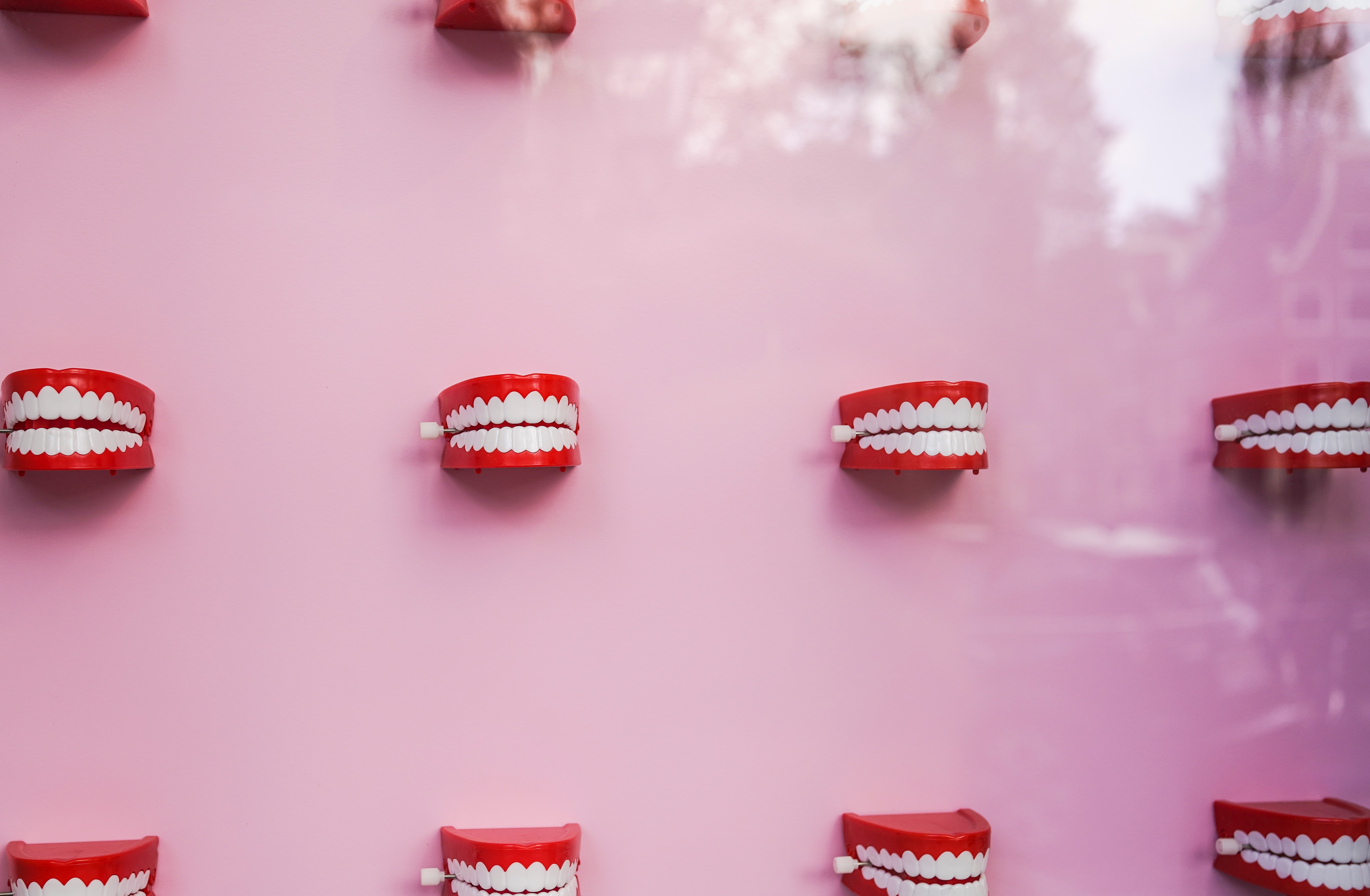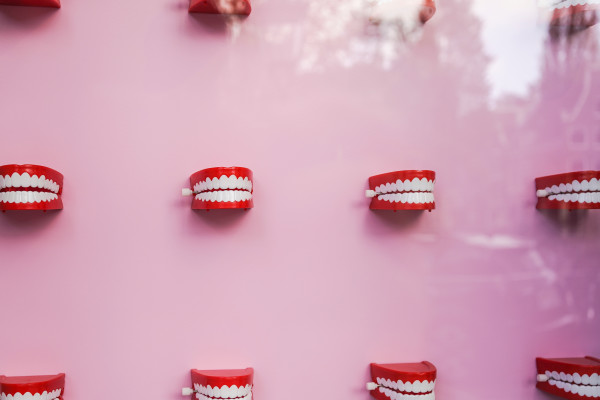How does perimenopause affect my teeth?
4 months ago
Perimenopause4 months ago
Perimenopause
You’ve probably heard of the ‘classic’ menopause symptoms: hot sweats, brain fog, insomnia. But did you know that the years leading up to your final period can have a big impact on your teeth? We ask a dentist to explain all…
If you’ve spent the majority of your life successfully dodging the dentist chair, only to be plagued with niggling dental as you hit your forties and fifties, there’s a chance that your hormones are to blame.
To help us understand the link between teeth and perimenopause, we asked dental expert Dr Alan Clarke, Clinical Director and Lead Dentist at Paste Dental , to unpack the science of what’s going on in our mouths. Plus, we discover his key advice for keeping our teeth in good condition as we navigate the perimenopause period.
Perimenopause affects every woman differently and teeth issues might not be something you have to worry about. In case it could be an issue for you, here are some key signs to look out for early so that you can nip them in the bud…
Receding gums: Falling oestrogen levels aren’t the best news for the mucous membranes of the body, including the inside of the mouth.
Over time, gums can appear to recede, revealing more of the tooth below. Our gums help to anchor our teeth in place, so changes to their size and shape can put us at bigger risk of a visit from the tooth fairy.
Gum inflammation: Oestrogen has a big effect on the amount of blood flow in the gums, which directly affects inflammation levels. “When there’s reduced blood flow, the gums can’t heal and remodel as usual,” says Alan.
If you already had low-grade inflammation from oral bacteria, the issue can flare up and get much worse during perimenopause.
Lost teeth: Plummeting oestrogen levels contribute to osteoporosis - aka, a loss of bone mass - not only in the spine and hips, but in the jawbone too. This can cause teeth to become loose or even fall out.
Burning mouth syndrome: Some women also experience unexplained pain and tenderness in the cheeks and lips.
Changes to the taste of food: Salty, sour and peppery flavours can taste differently during perimenopause. It’s important to explore these tastes with a dentist, as they may be the sign of an underlying condition.
Sensitivity: Lack of oestrogen thins the mouth tissues, causing the lining that covers your gums to decrease in thickness. “This can make your teeth a little bit more sensitive because you don’t have the same gum coverage around the roots,” says Alan.
Perimenopause might not be the sole cause of your oral health issues, but it can push your teeth into needing immediate action
Good ol’ fashioned toothache: Annoyingly, perimenopause can trigger the resurgence of old injuries and tooth traumas that you thought you’d laid to rest. This can include past dental work like crowns and root canal treatments.
Infections and mouth ulcers: As if we didn’t have enough to worry about, we can also be more susceptible to painful mouth sores too.
Alan is keen to point out that although perimenopause might not be the sole cause of your oral health issues, it can push your teeth into needing immediate action.
“If you’re already predisposed to dental issues through genetics or the bacterial load in your mouth, then perimenopause can have an inflammatory effect and raise your risk level,” warns Alan.
“We know that chronic inflammation of the gums - known as periodontal disease - can cause the bone levels to reduce in the jaw. And when the bone becomes weak, teeth are at greater risk of falling out.”
First up, don’t panic and start Googling the cost of overseas veneers. Alan says there are a ton of at-home lifestyle tweaks that can help to retain a winning smile.
1. Get the basics right
You might have gotten away with going to bed without brushing your teeth in your 20s, but Alan says that practising good oral hygiene is an absolute non-negotiable at this stage of life.
“Take a few extra minutes to get into all of the nooks and crannies with your toothbrush, and follow up with mouthwash and floss.” Many electric toothbrushes have in-built time prompts, but if in doubt, set a timer on your phone while you brush. As a benchmark, we should all be brushing for at least two minutes every morning and evening.
2. Don’t skip the floss!
Speaking of floss, Alan says it’s the one major thing that we need to be doing more of.
“If I was going to give everyone one tool for great teeth, I would take their toothbrush away and hand them floss instead. Obviously we need to be doing both, but people really overlook the importance of flossing and the difference it can make.”
“When we’re eating and drinking, we’re washing away the bacteria on the flat surface of the teeth,” says Alan. “It’s the in-between areas where food can sit for days, causing inflammation.
“Studies show that disrupting the bacterial load in the mouth every 24 hours by flossing can set you on a really good path to good oral health and mitigate some of the higher risks that come with perimenopause.”
Alan recommends opting for TePe interdental brushes over classic string floss, as they provide a deeper clean. If you’re unsure how to use them, there are loads of nifty dentist-backed tutorials on YouTube. Interdental brushes come in a few different sizes, so you can trial and error at home, or a hygienist can help to identify the best brush colour for your mouth.
3. Upgrade your tools
Are you attempting to clean your teeth with a toothbrush that’s seen better days? Then recycle those flattened bristles and treat your mouth to some new kit.
“Electric toothbrushes give a better clean than manual varieties,” believes Alan. “I like the Oral B iO range because it has a circular head and an oscillating motion that will get the bristles up and underneath the gum line.”
4. Skip the whitening toothpaste
“If you’re suffering from thinning gums and sensitivity, whitening toothpaste might be something to avoid,” says Alan, “as these are quite abrasive and have lots of gritty particles.”
If you want to give teeth whitening a go, he recommends having it professionally done at the dentist, as they can assess the health of your mouth and whether it’s suitable for you.
5. Carry a water bottle
As we mentioned earlier, a dry mouth can really mess with the balance of good and bad bacteria in your mouth.
When saliva isn’t available, water can help to swill out the mouth and keep your mucous membranes hydrated.
If I was going to give everyone one tool for great teeth, I would take their toothbrush away and hand them floss instead
If you struggle to remember to drink water, try buying a litre bottle and keeping it by your side so you can chug on-the-go. There are also sugar-free gums and mouth sprays that can promote salivary flow.
6. Consider HRT
Hormone Replacement Therapy (HRT) is a medical treatment designed to help women manage a range of menopause-related issues, including hot flushes, heart health and bone density. It works by topping up declining oestrogen levels in the body.
A small research study has also suggested that it could also be used to reduce gum disease and prevent tooth loss.
HRT comes with its own risks though, so if you’re unsure what’s right for you, check out our comprehensive guide to the therapy which explains your options.
7. Visit the dentist
Between work, family commitments and trying to maintain some semblance of a social life, dental appointments are probably the last thing on your mind. As with most life admin though, it pays to keep up with it.
“If you can afford to, see your hygienist and dentist every 3 to 6 months, as this will help to keep on top of any issues,” advises Alan. A hygienist can help to deep clean the teeth and remove any plaque or bacteria that may be contributing to gum disease.
8. Flag your meds
If you’re suffering with osteoporosis, a GP will often prescribe bisphosphonates - a group of drugs that work by slowing bone loss.
“These types of drugs can strengthen bones but slow down the healing and remodelling process,” says Alan. “They also have a long half-life, so if someone comes in for a dental operation like an implant or extraction, it can affect recovery.”
For this reason, Alan says it’s vital to have a dental check up and complete any surgical work before starting medication. And, as always, it’s important to keep your dentist updated with any medications you’ve been prescribed.
9. Kick the smoking habit
Smoking can quickly become a coping mechanism for hormonal changes, but that lunchtime cigarette could be making your symptoms much worse.
“Smokers are a big risk factor because tobacco and nicotine consumption can weaken the teeth. If you combine regular smoking with perimenopausal changes and a genetic predisposition to gum disease, then you’ve got a bad combination working against you,” says Alan.
“Smoking can also dry out the mouth, which means sugars sit on the teeth for longer, putting you at risk of dental decay and cavities.”
Losing a tooth doesn't mean a life sentence of feeling self-conscious when you smile, as there are lots of options to replace it:
Dental implants are surgically placed in your jawbone, where they serve as the roots of missing teeth. According to Alan, they should last around 20 to 25 years.
And dental bridges join an artificial tooth to adjacent teeth, anchoring the replacement in the spot of the missing tooth. They roughly last around 10 years.
Visiting the dentist isn’t anyone’s favourite task, but if you’re worried about your teeth or any symptoms you’re experiencing, it’s worth getting your teeth checked out.
Catching dental issues early can save a lot of discomfort and money in the long-run. As Alan says: “From a financial point-of-view, you’re going to save a fortune in the long-run, as it’s far cheaper to treat a small cavity than a bigger one.”
On your visit, make sure to mention your perimenopause symptoms and any support you’ve received, as it may have an impact on the treatment your dentist recommends.
Finally, Alan reassures that it’s never too late to get on top of your dental health. “Millions of people experience tooth issues, so you’re not alone in needing support,” he assures.
“Your local dental team is there to help you find solutions, so don’t put off coming to see us.”
 Cycle syncing
Cycle syncing Perimenopause
Perimenopause Perimenopause
Perimenopause Perimenopause
PerimenopauseSign up to learn everything you need to know about CycleMapping, plus how you can live better and feel better through optimising your fitness to you.
This website uses cookies to ensure you get the best experience on our website. Learn more

Sign up for the very latest news on women's fitness, health and hormones, plus be the first to receive exclusive offers and extras